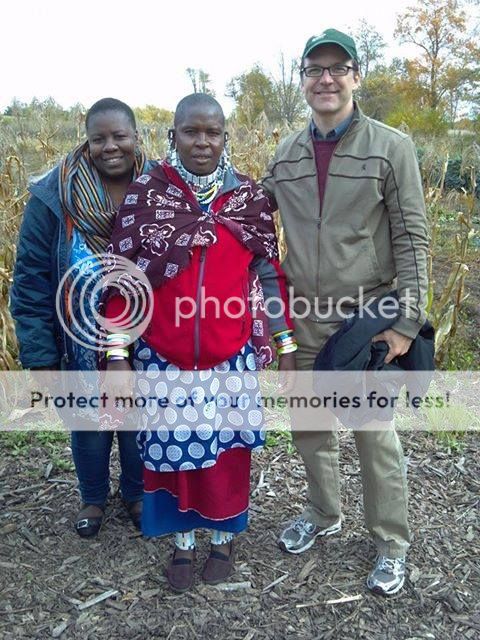This week's post comes from Oxfam Action Corps San Francisco! Co-organizer Yoshiko Hill reports back on her experience at the World Food Prize & Borlaug Dialogue.
Every year one of America's most quintessential agricultural states open its door to the most powerful players in food and agriculture to spark discussion around the future of food security and world hunger. Des Moines, Iowa welcomes elected officials, corporate executives, leaders in global development, renowned scientist and agriculture big wigs to the World Food Prize.
This year the three day conference featured keynotes from the President of Iceland, past UK Prime Minster Tony Blair and Cardinal Peter K.A. Turkson to name a few. The event certainly delivered on star power, but was lacking one important thing, the voices of the women and small-scale farmers who produce most of the world's food and represent 80% of the world's chronically hungry. This is where Oxfam America comes into play.
Oxfam has earned the largest non-profit presence at the World Food Prize and uses that position to secure prominent speaking roles for small-scale food producers from all over the world, including Oxfam's 2013 representatives, the awe-inspiring Kijoolu Kaliya and Harriet Nakabaale.
 |
| Kijoolu Kaliya featured center |
On the largest stage at the conference, Kijoolu Kaliya shared her firsthand experience with land grabs to a packed room and some of the biggest applause received by any World Food Prize speaker. Ms. Kaliya is a member of the Masaai community in Tanzania and a prominent community leader as well as a pastoralist. Over the past four years, she has been forced to fight two land grabs threatening the livelihoods of her people. The most recent of which came from a rich investor from the United Arab Emirates who was attracted to the lush landscapes and thriving wildlife where Ms. Kaliya lives which the Masaai culture has been working to preserve and nurture for years. After the government of Tanzania approved the land deal with this investor , he decided that he would drive Ms. Kaliya and her community off of their land by force. The Masaai people had their homes burned to the ground and were physically assaulted by the investor's thugs. Masaai leaders are traditionally male, but after this egregious attack, Ms. Kaliya mobilized the women in her community to do what the men had failed to do, protect their way of live. She organized a five day trek to the capital of Tanzania to demand an audience with the President by returning 2,000 political party membership cards to the government. This show of force got the President's attention and resulted in him making a public declaration affirming that the Masaai people were the rightful owners of their own land and that the investor had no claim to it, but this declaration was only verbal and in this day and age a verbal agreement is little assurance, especially when it comes to the livelihood of your family. Now Ms. Kaliya is fighting for a written contract guaranteeing their land rights, because as Ms. Kaliya stated “land is life.”
 |
| Harriet Nakabaale featured center |
Speaking at the Oxfam sponsored luncheon featuring Oxfam America's President Ray Offenheiser was Harriet Nakabaale, a sustainable and organic farming advocate from Uganda's capital city Kampala. With help from her son Jjumba Frank Luyinda, Ms. Nakabaale turned her home into a small urban farm called Camp Green. Through Camp Green, the mother-son team teach local community members, schools and local governments the importance of finding creative ways to re-purpose what most people would consider waste, protect the environment, and grow sustainable and nourishing food. Together they work to alleviate poverty within and outside of Uganda by arming people with the knowledge necessary to take food security into their own hands and grow the food that they need. Ms. Nakabaale shared her story with hundreds of people and also stressed the importance of tackling domestic violence by empowering women with the necessary tools to become bread winners.
At this year's World Food Prize, on behalf of Oxfam America, Kijoolu Kaliya and Harriet Nakabaale gave voice to the underrepresented majority working towards food security on the ground - the small-scale farmers, community leaders and advocates. These two women helped bridge the gap between theoretical discussions and the harsh realities facing families and communities around the world while also shedding light on the meaningful triumphs women are helping to accomplish everyday.
Want to learn more? Check out this video from Harriet here!
http://www.oxfamamerica.org/articles/harriet-nakabaales-camp-green/


